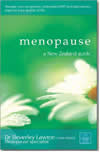Menopause a New Zealand Guide
 Beverley Lawton General Practitioner, researcher and a Past President of the Australasian Menopause Society is to be congratulated and thanked for her hard work and clarity in writing this concise and helpful book on menopause. Whilst its finer details are tailored specifically for New Zealanders, the topics she covers in the care of the menopausal woman have global interest, and her careful and timely summary of research data also pertain to world wide findings.
Beverley Lawton General Practitioner, researcher and a Past President of the Australasian Menopause Society is to be congratulated and thanked for her hard work and clarity in writing this concise and helpful book on menopause. Whilst its finer details are tailored specifically for New Zealanders, the topics she covers in the care of the menopausal woman have global interest, and her careful and timely summary of research data also pertain to world wide findings.
Whilst a woman with a secondary school education would be able to follow Lawton’s writing reasonably easily, health professionals, working both within and outside the realm of menopausal health, and women wanting more academic answers to questions would also be grateful for this book.
Why is this the case?
Dr Lawton focuses on each of the main aspects of menopause in turn: the physiology, treating the symptoms, the role of Hormone Therapy (HT) and complementary remedies, weight gain and its associated health problems of diabetes and heart disease, sexuality, osteoporosis and the vexed issue of breast cancer. But of particular value throughout this book is the care taken to evaluate current research in its clinical application. The findings of the WHI study in 2004 have made this book essential reading for those unsure of the current risks and benefits of HT use. Balancing the advantages of laying bare the current data concerning HT use, the author also looks at alternative remedies, both complementary and pharmaceutical, and where possible provides research data as to their effectiveness and side effects. Lawton’s useful list of internet references throughout the book enable the reader to access summaries of original research or to pursue further avenues of knowledge beyond he scope of the book. As a balance to the scientific writing, the book is laced with small case histories, bringing to us the human face of menopause.
Of particular value is her chapter on “Getting fatter”. Her description of the “Body Bank” concept, where specific choices regarding exercise and diet can be translated into life long “credits”, is practical and motivational.
Though by no way an exhaustive treatise on menopause, this is a good book to have on your shelf and to recommend to colleagues and patients, particularly those managing troublesome symptoms of menopause. The emphasis of certain WHI study data in recent years has influenced the practice of menopausal medicine. In this light, the book is helpful in appraising the merits of the WHI data in conjunction with other ongoing research in Menopause management. It also makes plain the absence of robust research available in the area of bioidentical hormonal prescribing and use.
Menopause a New Zealand Guide
By Dr Beverley Lawton
Published by Random House New Zealand
Content Updated September 29, 2008
